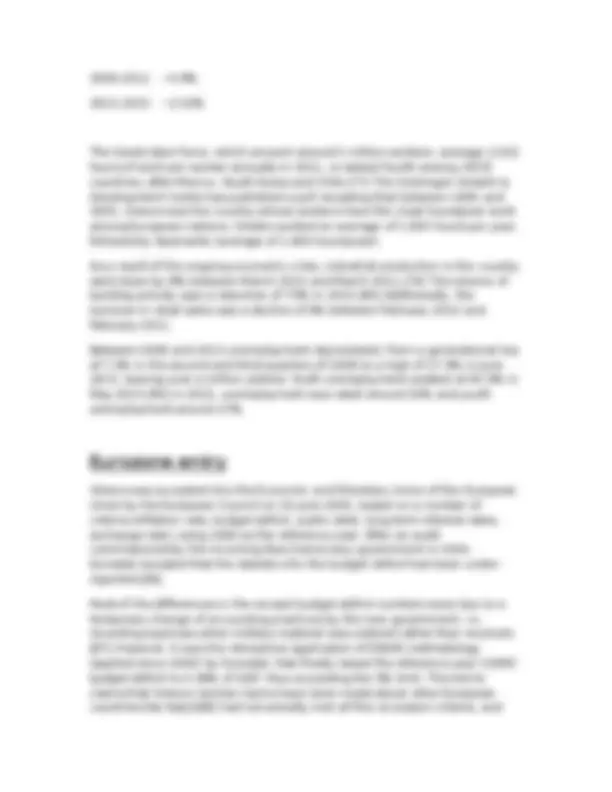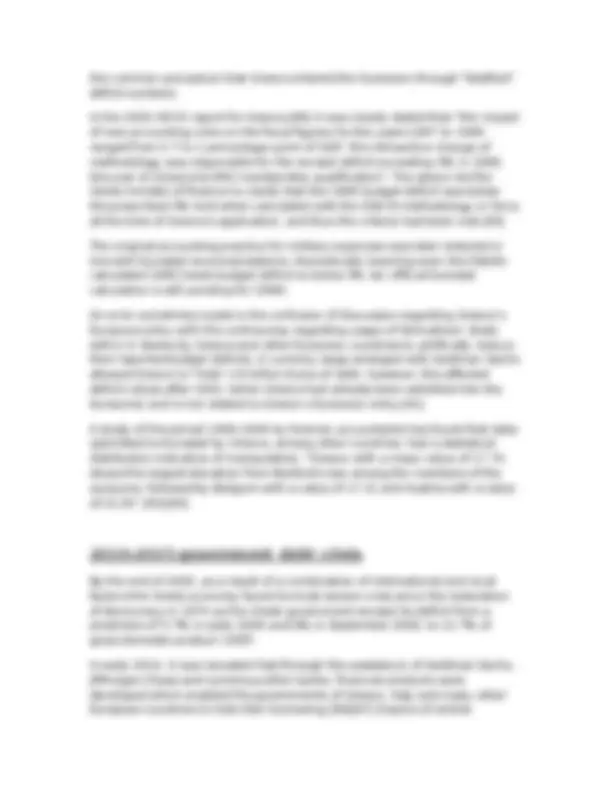





Study with the several resources on Docsity

Earn points by helping other students or get them with a premium plan


Prepare for your exams
Study with the several resources on Docsity

Earn points to download
Earn points by helping other students or get them with a premium plan
Community
Ask the community for help and clear up your study doubts
Discover the best universities in your country according to Docsity users
Free resources
Download our free guides on studying techniques, anxiety management strategies, and thesis advice from Docsity tutors
The Fall of the Greek Economy and detailed understanding of it's economic stand in the European Union
Typology: Study Guides, Projects, Research
1 / 7

This page cannot be seen from the preview
Don't miss anything!




The economy of Greece is the 46th largest in the world with a nominal gross domestic product (GDP) of $195.2 billion per annum.[4] It is also the 52nd largest in the world by purchasing power parity, at $288.8 billion per annum. [5] As of 2015, Greece is the fifteenth-largest economy in the 28-member European Union.[33] Greece is ranked 38th and 44th in the world at $21, and $25,954 for nominal GDP per capita and purchasing power parity per capita respectively.
Greece is a developed country with an economy based on the service (82.8% ) and industrial sectors (13.3%). The agricultural sector contributed 3.9% of national economic output in 2015.[2] Important Greek industries include tourism and shipping. With 18 million international tourists in 2013, Greece was the 7th most visited country in the European Union and 16th in the world.[34] The Greek Merchant Navy is the largest in the world, with Greek- owned vessels accounting for 15% of global deadweight tonnage as of 2013. [35] The increased demand for international maritime transportation between Greece and Asia has resulted in unprecedented investment in the shipping industry.[36]
The country is a significant agricultural producer within the EU. Greece has the largest economy in the Balkans and is as an important regional investor. [37][38] Greece was the largest foreign investor in Albania in 2013,[39] the third in Bulgaria, in the top-three in Romania and Serbia and the most important trading partner and largest foreign investor in the former Yugoslav Republic of Macedonia.[40][41][42] The Greek telecommunications company OTE has become a strong investor in former Yugoslavia and in other Balkan countries.[40]
Greece is classified as an advanced,[43] high-income economy,[44] and was a founding member of the Organisation for Economic Co-operation and Development (OECD) and of the Organization of the Black Sea Economic Cooperation (BSEC). The country joined what is now the European Union in 1981.[1] In 2001 Greece adopted the euro as its currency, replacing the Greek drachma at an exchange rate of 340.75 drachmae per euro.[1][45] Greece is a member of the International Monetary Fund and of the World Trade Organization, and ranked 34th on Ernst & Young's Globalization Index 2011.[46]
World War II (1939-1945) devastated the country's economy, but the high levels of economic growth that followed from 1950 to 1980 have been called the Greek economic miracle.[47] From 2000 Greece saw high levels of GDP growth above the Eurozone average, peaking at 5.8% in 2003 and 5.7% in 2006.[48] The subsequent Great Recession and Greek government-debt crisis, a central focus of the wider European debt crisis, plunged the economy into a sharp downturn, with real GDP growth rates of −0.3% in 2008, −4.3%
in 2009, −5.5% in 2010, −9.1% in 2011, −7.3% in 2012 and −3.2% in 2013. [49] In 2011, the country's public debt reached €356 billion (172% of nominal GDP).[50] After negotiating the biggest debt restructuring in history with the private sector, Greece reduced its sovereign debt burden to €280 billion (137% of GDP) in the first quarter of 2012.[51] Greece achieved a real GDP growth rate of 0.7% in 2014 after 6 years of economic decline,[49][52] but fell back into recession in 2015.
The evolution of the Greek economy during the 19th century (a period that transformed a large part of the world because of the Industrial Revolution) has been little researched. Recent research from 2006[54] examines the gradual development of industry and further development of shipping in a predominantly agricultural economy, calculating an average rate of per capita GDP growth between 1833 and 1911 that was only slightly lower than that of the other Western European nations. Industrial activity, (including heavy industry like shipbuilding) was evident, mainly in Ermoupolis and Piraeus.[55][56] Nonetheless, Greece faced economic hardships and defaulted on its external loans in 1826, 1843, 1860 and 1894.[57][58]
Other studies support the above view on the general trends in the economy, providing comparative measures of standard of living. The per capita income (in purchasing power terms) of Greece was 65% that of France in 1850, 56% in 1890, 62% in 1938,[59][60] 75% in 1980, 90% in 2007, 96.4% in 2008 and 97.9% in 2009.
The country's post-World War II development has largely been connected with the Greek economic miracle.[47] During that period, Greece saw growth rates second only to those of Japan, while ranking first in Europe in terms of GDP growth.[47] It is indicative that between 1960 and 1973 the Greek economy grew by an average of 7.7%, in contrast to 4.7% for the EU15 and 4.9% for the OECD.[47] Also during that period, exports grew by an average annual rate of 12.6%.
Greece enjoys a high standard of living and very high Human Development Index, ranking 29th in the world in 2013.[63] However, the severe recession of recent years has seen GDP per capita fall from 94% of the EU average in 2009 to 71% in 2015.[64][65] Actual Individual Consumption (AIC) per capita fell from 104% of the EU average to 81% during the same period.
The Greek labor force, which amount around 5 million workers, average 2, hours of work per worker annually in 2011, is ranked fourth among OECD countries, after Mexico, South Korea and Chile.[77] The Groningen Growth & Development Centre has published a poll revealing that between 1995 and 2005, Greece was the country whose workers have the most hours/year work among European nations; Greeks worked an average of 1,900 hours per year, followed by Spaniards (average of 1,800 hours/year).
As a result of the ongoing economic crisis, industrial production in the country went down by 8% between March 2010 and March 2011,[79] The volume of building activity saw a reduction of 73% in 2010.[80] Additionally, the turnover in retail sales saw a decline of 9% between February 2010 and February 2011.
Between 2008 and 2013 unemployment skyrocketed, from a generational low of 7.2% in the second and third quarters of 2008 to a high of 27.9% in June 2013, leaving over a million jobless. Youth unemployment peaked at 64.9% in May 2013.[85] In 2015, unemployment was rated around 24% and youth unemployment around 47%.
Greece was accepted into the Economic and Monetary Union of the European Union by the European Council on 19 June 2000, based on a number of criteria (inflation rate, budget deficit, public debt, long-term interest rates, exchange rate) using 1999 as the reference year. After an audit commissioned by the incoming New Democracy government in 2004, Eurostat revealed that the statistics for the budget deficit had been under- reported.[86]
Most of the differences in the revised budget deficit numbers were due to a temporary change of accounting practices by the new government, i.e., recording expenses when military material was ordered rather than received. [87] However, it was the retroactive application of ESA95 methodology (applied since 2000) by Eurostat, that finally raised the reference year (1999) budget deficit to 3.38% of GDP, thus exceeding the 3% limit. This led to claims that Greece (similar claims have been made about other European countries like Italy)[88] had not actually met all five accession criteria, and
the common perception that Greece entered the Eurozone through "falsified" deficit numbers.
In the 2005 OECD report for Greece,[89] it was clearly stated that "the impact of new accounting rules on the fiscal figures for the years 1997 to 1999 ranged from 0.7 to 1 percentage point of GDP; this retroactive change of methodology was responsible for the revised deficit exceeding 3% in 1999, the year of [Greece's] EMU membership qualification". The above led the Greek minister of finance to clarify that the 1999 budget deficit was below the prescribed 3% limit when calculated with the ESA79 methodology in force at the time of Greece's application, and thus the criteria had been met.[90]
The original accounting practice for military expenses was later restored in line with Eurostat recommendations, theoretically lowering even the ESA95- calculated 1999 Greek budget deficit to below 3% (an official Eurostat calculation is still pending for 1999).
An error sometimes made is the confusion of discussion regarding Greece’s Eurozone entry with the controversy regarding usage of derivatives’ deals with U.S. Banks by Greece and other Eurozone countries to artificially reduce their reported budget deficits. A currency swap arranged with Goldman Sachs allowed Greece to "hide" 2.8 billion Euros of debt, however, this affected deficit values after 2001 (when Greece had already been admitted into the Eurozone) and is not related to Greece’s Eurozone entry.[91]
A study of the period 1999–2009 by forensic accountants has found that data submitted to Eurostat by Greece, among other countries, had a statistical distribution indicative of manipulation; "Greece with a mean value of 17.74, shows the largest deviation from Benford's law among the members of the eurozone, followed by Belgium with a value of 17.21 and Austria with a value of 15.25".[92][93]
By the end of 2009, as a result of a combination of international and local factors the Greek economy faced its most-severe crisis since the restoration of democracy in 1974 as the Greek government revised its deficit from a prediction of 3.7% in early 2009 and 6% in September 2009, to 12.7% of gross domestic product (GDP).
In early 2010, it was revealed that through the assistance of Goldman Sachs, JPMorgan Chase and numerous other banks, financial products were developed which enabled the governments of Greece, Italy and many other European countries to hide their borrowing.[96][97] Dozens of similar
In 2013, Greece became the first developed market to be reclassified as an emerging market by financial services companies MSCI and S&P Dow Jones Indices.[119][120][121]
By July 2014 there was still anger and protests about the austerity measures, with a 24-hour strike among government workers timed to coincide with an audit by inspectors from the International Monetary Fund, the European Union and European Central Bank in advance of a decision on a second bailout of one billion euros ($1.36 billion), due in late July.[122]
Greece exited its six-year recession in the second quarter of 2014, but the challenges of securing political stability and debt sustainability remain.